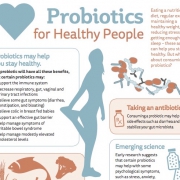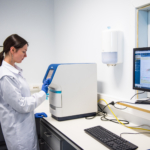New publication co-authored by ISAPP board members gives an overview of probiotics, prebiotics, synbiotics, and postbiotics in infant formula
For meeting the nutritional needs of infants and supporting early development, human milk is the ideal food—and this is reflected in breastfeeding guidelines around the world, including the World Health Organization’s recommendation that babies receive human milk exclusively for the first six months of life and that breastfeeding be continued, along with complementary foods, up to two years of age or beyond. In certain cases, however, breastfeeding is challenging or may not even be an option. Then, parents rely on alternatives for feeding their infants.
A group of scientists, including three ISAPP board members, recently co-authored an article in the journal Nutrients entitled Infant Formula Supplemented with Biotics: Current Knowledge and Future Perspectives. In the review, they aimed to highlight the new technologies and ingredients that are allowing infant formula to better approximate the composition of human milk. They focused on four types of ingredients: probiotics, prebiotics, synbiotics, and postbiotics.
Co-author Gabriel Vinderola, Associate Professor of Microbiology at the Faculty of Chemical Engineering from the National University of Litoral and Principal Researcher from CONICET at Dairy Products Institute (CONICET-UNL) in Santa Fe, Argentina says, “Modern technologies have allowed the production of specific microbes, subtrates selectively used by the host microbes, and even non-viable microbes and their metabolites and cell fragments—for which scientific evidence is available on their effects on infant health, when administered in adequate amounts. Thus, this current set of gut modulators can be delivered by infant formula when breastfeeding is limited or when it is not an option.”
The authors say a well-functioning gut microbiota is essential for the overall health and proper development of the infant, and components of human milk support the development of this microbiota. They list important human milk components and the novel ingredients that aim to mimic the functions of these components in infant formulas:
- Human milk oligosaccharides (HMOs)
HMOs are specialized complex carbohydrates found in human milk, which are digested in the infant colon and serve as substrates for beneficial microbes, mainly bifidobacteria, residing there. In recent years, prebiotic mixtures of oligosaccharides (e.g. short-chain GOS and long-chain FOS) have been added to infant formula to recapitulate the effects of HMOs. But now that it’s possible to produce several types of HMOs synthetically, some infant formulas are enriched with purified HMOs: 2’-fucosyllactose (2’FL) or lacto-N-neotetraose (LNnT). Even 3′-galactosyllactose (3′-GL) can be naturally produced by a fermentation process in certain infant formulas.
- Human milk microbiota
Human milk has a complex microbiota, which is an important source of beneficial bacteria to the infant. Studies support the notion that the human milk microbiota delivers bioactive components that support the development of the infant’s immune system. Probiotic strains are sometimes added to infant formula in order to substitute for important members of the milk microbiota.
- Bacterial metabolites
Human milk also contains metabolic byproducts of bacteria called “metabolites” in addition to the bacteria themselves. These components have not been fully studied to date, but bacterial metabolites such as butyrate and other short-chain fatty acids may have important health effects for the overall development of the infant. A future area of nutritional research is likely to be the addition of ‘postbiotics’ — non-viable cells, their metabolites and cell components that, when administered in adequate amounts, promote health and well-being — to infant formulas. (ISAPP convened a scientific consensus panel on the definition of postbiotics, with publication of this definition expected by the end of 2020.)
The precise short- and long-term health benefits of adding the above ingredients to infant formula are still under study. One pediatric society (the ESPGHAN Committee on Nutrition) examined the data in 2011 and at that time did not recommend the routine use of infant formulas with added probiotic and/or prebiotic components until further trials were conducted. A systematic review concluded that evidence for the health benefits of fermented infant formula (compared with standard infant formula) are unclear, although improvements in infant gastrointestinal symptoms cannot be ruled out. Although infant formulas are undoubtedly improving, review co-author Hania Szajewska, MD, Professor of Paediatrics at The Medical University of Warsaw, Poland, says, “Matching human milk is challenging. Any alternative should not only match human milk composition, but should also match breastfeeding performance, including how it affects infant growth rate and other functions, such as the immune response.”















